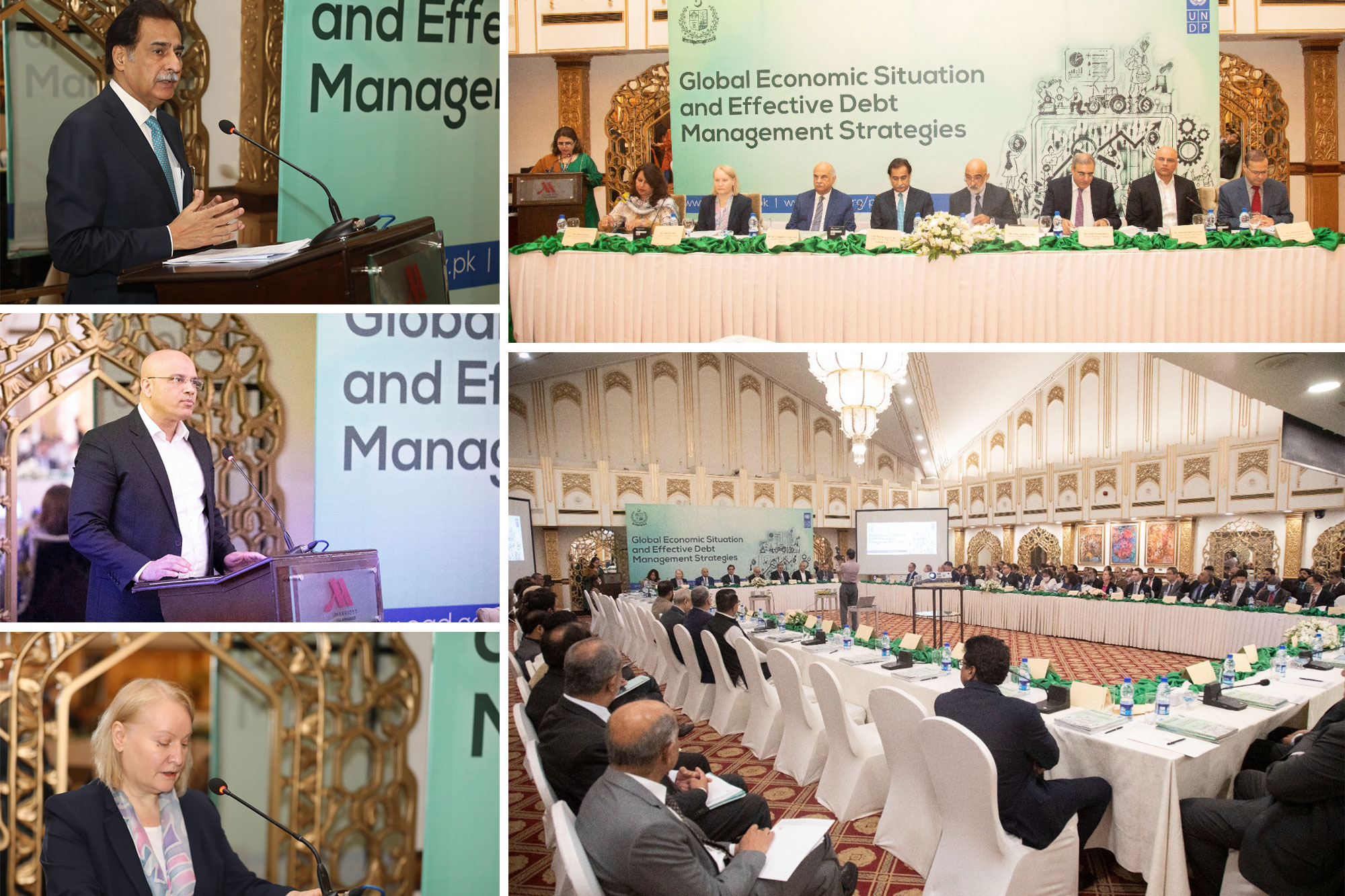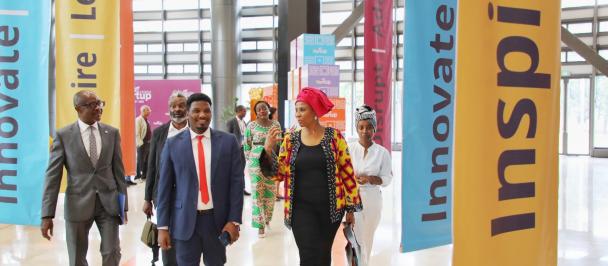Ministry of Economic Affairs and UNDP organize a policy seminar on Pakistan’s Debt Management Portfolio
June 21, 2022

Islamabad, 21 June 2022— Ministry of Economic Affairs, Economic Affairs Division (EAD), and UNDP Pakistan hosted a policy seminar, today, on the “Global Economic Situation and Effective Debt Management Strategies”. The seminar facilitated expert discussion and policy recommendations for Pakistan to effectively respond to its current debt situation and the challenges posed by it.
Although Pakistan is the world’s fifth-most populous and lower middle-income country, it aspires to be among the world’s ten largest economies by 2047. However, the country is currently faced with a challenging economic situation, with a debt in excess of PKR 50 trillion (>$250 billion). On the macroeconomic front, Pakistan is faced with daunting challenges, which include rising current account deficits and trade imbalances, depleting foreign exchange reserves, soaring inflation, a narrow tax base, as well as elevated energy prices and subsidies denting the national exchequer.
In this context, the seminar brought together senior government representatives, national economists and subject matter experts, and representatives of Pakistan’s development partners, including multilateral and bilateral donors and U.N. Agencies. They had a fruitful discussion on Pakistan’s debt challenges and proposed strategic recommendations and sectoral solutions for effective debt management to maintain financial stability and insulate Pakistan’s economy from external shocks.
In his keynote address, Honorable Mr. Sardar Ayaz Sadiq, Federal Minister for Economic Affairs, spoke about the importance of managing the country’s debt in a sustainable and growth-prioritizing manner, stating: “High international fuel and commodity prices, and a bludgeoning trade deficit have resulted in a significant depreciation of the Pak Rupee against the US Dollar, which in turn contributed to high inflation - forcing one third of the population of Pakistan to live in poverty. In such a precarious situation, the incumbent Government has to manage debt with a vision for economic recovery, to improve the macroeconomic indicators along with focusing on the vulnerable segments of society.” Other officials included Mr. Mian Asad Hayaud Din, Secretary, Federal Ministry of Economic Affairs; Mr. Awais Mansoor Sumra, Special Secretary, Finance Division; Ms. Anita Turab, Joint Secretary, Ministry of Economic Affairs; senior officials from other Ministries and line departments; Ms. Aliona Niculita, Officer In-Charge, UNDP Pakistan; and Mr. Swarnim Wagle, Chief Economic Advisor at UNDP Regional Bureau for Asia and the Pacific.
Secretary, Federal Ministry of Economic Affairs, Mr. Mian Asad Hayaud Din, said at the occasion, “There is a greater need to shift towards an approach of achieving fiscal solvency, and moving from an asset creation approach to an asset management approach for managing debt effectively and achieving economic growth”.
Ms. Aliona Niculita Officer In-Charge, UNDP Pakistan expanded on the theme, stating, “Since 2018, UNDP Pakistan has undertaken policy advisory initiatives for the Government of Pakistan on debt management and green and innovative financing solutions, to enable green recovery and accelerate natural capital restoration. In fact, UNDP has aligned its programming interventions with emerging global needs and national priorities, recognizing the importance of investments in human capital and aligning the national economic policies to the globally accredited Financing for Development paradigm”.
The policy seminar also included a global and regional overview on the theme by UNDP RBAP’s Mr. Swarnim Wagle, who stated, “The hyperinflation, external debt, and the inability to pay lead to twin crisis situation - a combination of both liquidity and solvency crisis. Sri Lanka is the third country to default after Zambia and Lebanon since the onset of the COVID pandemic. Other countries may learn from these cases.”
Senior economists and experts participated in a panel discussion at the seminar, including Dr. Syed Akbar Zaidi, Dr. Pervez Tahir, Mr. Haroon Sharif, Dr. Salman Shah, Dr. Shahida Wizarat. Dr. Jehanzeb Khan, and Mr. Sajid Amin. The panel explored a number of priority topics, such as the need for rethinking fiscal consolidation and role of provinces in macroeconomic stabilization efforts under the current scenario; challenges and potential solutions for managing the energy sector and circular debt; impact of domestic loans on debt sustainability and economic growth; existing policy gaps, structural vulnerabilities and exposure to shocks; and potential opportunities and way forward for developing economies like Pakistan. The discussion also revolved around the need to have diversification in debt financing instruments; creating enabling environments for public-private partnerships to enable market-based economies; enhancing federal and provincial coordination; and moving from asset creation to an asset management approach. There was a consensus that that current economic model has not been optimal for the country, and that the four-to-five-decade old challenges of Pakistan’s economic situation require modern day, market-oriented solutions for inclusive and sustainable growth.
To bolster discussion on Pakistan’s debt management portfolio and green and innovative financing solutions, UNDP Pakistan also released its quarterly publication the Development Advocate Pakistan’s June 2022 edition at the seminar, on the topic of “Inclusive Growth in Times of Uncertainty”. UNDP also launched an advocacy brief on “Financing Climate Action in Pakistan: Solutions and Way Forward”.
Both the latest edition of DAP as well as the advocacy brief can be found at:
DAP | Inclusive Growth in Times of Uncertainty: Link
Advocacy Brief | Financing Climate Action in Pakistan: Solutions and Way Forward: Link
For additional information, please contact Ayesha Babar at ayesha.babar@undp.org or +92 (51) 835 5650
### ### ###
UNDP is the leading United Nations organization fighting to end the injustice of poverty, inequality, and climate change. Working with our broad network of experts and partners in 170 countries, we help nations to build integrated, lasting solutions for people and planet.
Learn more at undp.org or follow at @UNDP

 Locations
Locations



